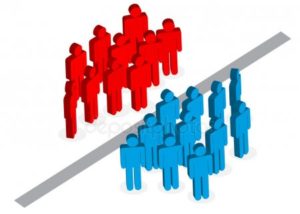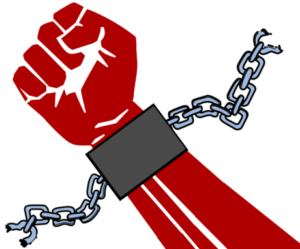*Identities May Apply
A strong understanding of who you are, how you choose to live your life, and how you interact with the world around you–seems like a good enough definition for something as personalized as one’s identity. Since personal identity influences how we behave with others it’s a logical step that it would play into our political leanings, goals, and voting patterns. These identity politics have become an area of hot debate in the recent political climate, but rather than being seen as a divisive measure tearing our country apart, we should see it as a natural progression of our experiences affecting our political ideals. I will be arguing on behalf of the idea that identity politics are a healthy extension of political diversification. This only holds true if the platform given is used for the growth of the community, not for soapboxing on behalf of an individual.
Why do we as people try to fit ourselves into these boxes–these identities? We are a nation composed of innumerable different cultures and backgrounds swirling together in one mixing pot; shouldn’t that fact alone push us towards a collective identity of outsiderdom? People are all different. Forcing folks to assimilate to a common label on account of the country they call home would cause us to lose an inconceivable amount of diversity and untapped learning opportunities. While I believe that conformation for all under one label is wrong, people grouping together has and will always be a reality, just one of smaller population size. We can only have strong bonds with so many people, and those who have shared experiences will come much easier to us.
What are these identities that we choose to describe us and why do they hold enough power to cause these social and political rifts? Race is a definite facet of identity politics. In this country (and many others) skin color factors into what opportunities a person may or may not receive. Is it wrong to bond with one another due to the persecution of race? Or is banding together and finding a home in those you can relate to exactly what is needed. The same goes for gender, sexuality, and any other identifying trait that has been used as a weapon against people, both in the past and currently.
The 2016 election was one lost by a misuse of identity politics. Hillary Clinton put the most effort into trying to appeal to minority groups (women, LGBT folks, and people of color). Instead of unifying her vote, she made groups with more voting power feel unheard and underrepresented. It’s problems like these which usher forth a more unfavorable view of identity politics. NYT writer Mark Lilla wrote a polarizing opinion piece named “The End Of Identity Liberalism” in which he shoots down the historically liberal mindset of bringing attention to diversity through celebration by theorizing that the aforementioned idea forces a separation between people that doesn’t need to exist. Lilla goes on to say that we need a “post-identity liberalism” that restructures itself to appeal to Americans as Americans and that focuses its attention on problems that we all face, rather than making an issue where there isn’t one. While this is a valid suggestion, glossing over systematically oppressed groups to instead support what we know and are used to is a blatant expression of our disregard to those groups without power. It’s problems like these that bring us to white identity politics.
“If you’re a member of the dominant group,” says Vox writer Sean Illing, “your identity is taken for granted precisely because it’s not threatened.” White identity politics are an ideology stemming from one thing. Fear of becoming the minority and losing that undeniable power. Donald Trump appealed to white folk by drawing a line between Us and Them and it won him the election. Two major white identity politics group spring to mind- the Ku Klux Klan and the alt-right. These groups are founded on behalf of affording the U.S. population a white ethno-state without intrusion from “lower races”. There is a different, more subtle expression of whiteness that is even more sinister, though. In a since deleted video filmed by Richard Spencer, posterboy for the developing neo-Nazi political phenomena in the U.S., for the National Policy Institute says this: “So long as we avoid and deny our identities, at a time when every other people is asserting its own, we will have no chance to resist our dispossession, no chance to make our future, no chance to find another horizon”. This tiptoeing around race identity during a time when nearly everyone has something to say about their background and how they too face oppression is dangerously persuasive to those who see no problem with siding with a neo-Nazi. Spencer and many other conservative people harmonize when they are able to reach an audience with this rhetoric of fear of what is to come if whiteness is lost. If white identity politics are not built from distrusting other races I don’t know what they are.
While this fear of whiteness being ousted as the norm percolates amongst some groups, my whiteness is also brought to mind. I am white (no capital “W” as Spencer would have it), and I have been afforded a great many opportunities because of that. People do not cross the street to get away from some societally trained fear of me. I never worry about seeing a police officer driving slowly next to me. I receive these luxuries of whiteness without batting an eye because this is what I’m used to – this is my normal. In fairness, I do also sometimes feel spoken over in these conversations of whiteness. Not because I feel as if I should be handed more opportunities because of my skin color, but because those who do tout their lack of melanin do it from a perspective that directly contrasts with other facets of my identity and leaves me in the lurch on issues I find more pressing.

Bernie Sanders, a self-described democratic socialist, puts this into words I deeply resonate with; “We can talk about it as a racial issue, but it is a general economic issue. We need to start paying attention to the needs of working families in this country.”. I grew up in an area of St. Louis where the average household brought in less than $19,000 yearly for income of families of four or more. There was one health clinic nearby (of which I am still a patient) which was sliding scale only, had four different language interpreters, not out of inclusion, but necessity, and whose pharmacy windows were made from bulletproof glass to protect from robberies. My identity as Poor has a much greater impact on my life than the trappings of whiteness have brought me. As Laila Lalami of The New York Times put it, “These voters suffer from economic disadvantages even as they enjoy racial advantages” (Lalami). Whiteness affords me many things, but they present as allowing me a freedom I’ve never known to be anything but available. This is the privilege those in a white panic seem to be missing. If we are white and raised to be more racially accepting, more often than not we ascribe a different political or social minority group onto ourselves. Oppression is oppression. Who am I to say one sort of systematic dehumanization is worse than another? Yet still, I am a woman.
Politics, race, and anything else will divide, we just need to find ways to bring everything back together. We need to listen to everyone’s voices, even if it is difficult. If we are ever to coalesce under one title, American or otherwise, we will need to understand where every last one of our fellow humans are coming from. Open minds, open hearts, open discussion for all. Of course differing opinions will have contrasting mindsets, but here at Truman people from innumerable different cultures and backgrounds are swirling together in one mixing pot, shouldn’t that fact alone push us towards trying to find a single collective identity? Isn’t bulldog enough?
Illing, Sean. “White Identity Politics Is about More than Racism.” Vox, Vox, 27 Apr. 2019, https://www.vox.com/2019/4/26/18306125/white-identity-politics-trump-racism-ashley-jardina.
Lilla, Mark. “The End of Identity Liberalism.” The New York Times, The New York Times, 18 Nov. 2016, https://www.nytimes.com/2016/11/20/opinion/sunday/the-end-of-identity-liberalism.html?mwrsm=Email.
Haider, Shuja. “Safety Pins and Swastikas.” Jacobin, 1 May 2017, https://www.jacobinmag.com/2017/01/safety-pin-box-richard-spencer-neo-nazis-alt-right-identity-politics/.
Lalami, Laila. “The Identity Politics of Whiteness.” The New York Times, The New York Times, 21 Nov. 2016, https://www.nytimes.com/2016/11/27/magazine/the-identity-politics-of-whiteness.html.

